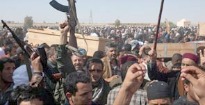Tripoli Erasing Signs Of Revolt
 The Washington Post reports:
The Washington Post reports:
TRIPOLI, Libya — In the streets and alleyways of this cowed and fearful city, the lingering traces of a crushed revolution are fading fast.
At one junction, the charred remains of tires burned by demonstrators are being flattened by traffic as Tripoli gradually returns to a semblance of normality. A scorched police station is operating again, with police in black uniforms and green bandannas sitting on stools outside. The bloodstains in a sandy side street, where residents say soldiers opened fire with live ammunition, have been washed away by spring rains.
And in Green Square, the symbolic heart of the city, government supporters — not anti-regime demonstrators — gather on a daily basis to chant slogans and brandish portraits in a triumphal assertion of Moammar Gaddafi’s continuing grip on power.
With the United States and its allies poised to take military action to protect rebels in the far east of the country, it may be too late to revive the failed uprising in the capital. In Tripoli, Gaddafi’s stronghold, the real battle for Libya appears to have already been fought and won by a regime that was willing to use live ammunition against its opponents.
It was that brutal response by Gaddafi’s forces that probably sealed the fate of the month-old uprising, according to the whispered confidences of residents opposed to the government who spoke only on the condition that they not be identified. There have been just a few scattered demonstrations since Feb. 25, when Gaddafi supporters roamed the streets opening fire on protesters, reportedly killing dozens.
But the rebels may have miscalculated, too. Their revolt rekindled regional rivalries, tainting the uprising with a whiff of separatism. Their calls for Western intervention also summoned the specter of civil war, alienating some who might have supported peaceful protests.
“Any Western military action against the government now will only stimulate more support for the government, because it will show that this battle is being fought on behalf of the West,” said Mustafa Fetouri, director of the business administration program at the Academy of Graduate Studies in Tripoli.
Fetouri, who describes himself as independent, says he initially supported some of the protesters’ demands for greater freedoms and an end to corruption. But he says the rebels made a mistake by taking up arms and appealing for outside help, as well as by adopting as their symbol the flag of King Idris, an easterner overthrown by Gaddafi’s 1969 coup whose rule was deeply resented by Libyans elsewhere.
“The flag they used is totally hated in this part of the country, because Idris Senussi came from the east,” Fetouri said. “The political message that the flag sent was either that the east is rising up to dominate the west, or that they want to divide up Libya, and why should we let them do that?”
Click here to read more.

